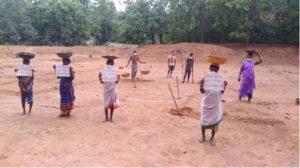 Since the partial lifting of the lockdown in some parts of the country, various state governments have started MGNREGS activities in some measure.
Since the partial lifting of the lockdown in some parts of the country, various state governments have started MGNREGS activities in some measure.
As migrant workers across the country return to their villages, rural India’s dependence on MGNREGS wages for survival is expected to increase manifold. If we expect MGNREGS to effectively reduce rural distress, some changes will have to be made in its design and implementation—for as long as rural communities grapple with the economic aftershocks induced by the pandemic.
The following suggestive measures can effectively strengthen the role that MGNREGS play in responding to the COVID-19-induced crisis.
Prioritising Individual Benefitting Schemes: Work schemes that can be taken up by individuals and small groups of 4-6 workers must be prioritised. Across many parts of the country, preparation for the kharif season is being underway, and individual schemes such as repairing and strengthening bunds on land used for paddy cultivation and fencing of croplands can be introduced. Additionally, schemes for building individual assets such as goat and poultry sheds, dug wells, and farm ponds should also be given priority. For as long as the lockdown continues, work schemes that are relatively less material-intensive should be taken up, as it is difficult to ensure material procurement at worksites.
Increase the number of work schemes: Currently there are limited work schemes running per panchayat, which is leading to huge crowd of workers at worksites. To prevent this and to ensure that all willing households are able to access employment through MGNREGS, the number of schemes needs to be increased and introduced in each village.
Payment to workers instantly: Rural households urgently need cash-in-hand, and so the emerging demand is for immediate payment to workers. MGNREGS payments are frequently delayed by weeks or months. Given the circumstances, such delays will be entirely counterproductive. Instead, in remote areas, wage payments should be made in cash, and paid on the same day. In other areas, they must be ensured within a week of submission of muster rolls. To facilitate this, panchayats—who are the implementing agencies for MGNREGS—can be advanced a revolving fund which can be used to pay workers.
Modify daily workloads: In compliance with COVID-19 guidelines, workers are wearing masks and other forms of face protection. MGNREGS works typically involve hard physical labour and workers are finding it challenging to breathe comfortably while working. Consequently, for as long as workers are required to wear masks, the daily volume of work assigned to them should be reduced or rests in between can be allowed. All MGNREGS work sites must be adequately stocked with the necessary supplies, including water, soap, and sanitiser, to ensure workers’ safety in compliance with COVID-19 safety and hygiene guidelines.
Increase wages: If MGNREGS wages are to effectively support rural households as they cope with this crisis, they must, at a minimum, be at par with states’ agricultural wages. For example, the Government of Odisha has increased the daily-wage rate for unskilled manual work under MGNREGS to INR 298 per day in 20 migration-prone blocks of four districts under DMF (Balangir, Bargarh, Nuapada, Kalahandi). This amounts to an additional amount of INR 91 over and above the notified minimum MGNREGS wages in the state, which is INR 207 per day. The Odisha Government should implement the enhanced wage for unskilled across the state and other states should follow Odisha’s lead, especially in vulnerable districts,
Increase guaranteed days of work: In light of the limited income-generating activities available in rural India, the number of days of work per job card should be increased from 100 person days per year to 200 person days per year. This move will be especially valuable in blocks that have a high percentage of marginal and landless farmers, Adivasi households, and where migration is high—particularly in the tribal belts. Here too, the Government of Odisha has set an example, by announcing that it will provide an additional 100 days of work, over and above the stipulated 100 days work mandated under MGNREGS in 20 vulnerable blocks.
Issue of Job Cards: Job cards should be issued to all those who demand MGNREGS work, within 24-48 hours of receiving an application for the same. In cases where job cards are in the custody of middlemen, these should be reissued immediately.
Include single women: Often, at MGNREGS worksites two people from a household will work on a scheme together—the men dig the soil and their female counterparts take on the role of head loaders—transporting the excavated soil. In compliance with COVID-19 guidelines, the muster rolls that are currently being issued are limited to 5-6 workers. While this ensures physical distancing at work sites, it is also resulting in a tendency to avoid enrolling single women workers who are seeking employment through MGNREGS. Officers who receive demands for work and issue muster rolls must remain cognisant of this and special care must be taken to enrol single women in MGNREGS works.
Strengthen delivery mechanisms: For MGNREGS to function effectively, government departments must be adequately staffed to support the demand for work, oversee work sites, and make timely payments. This means that people who are staffed to MGNREGS departments—engineers, supervisors, and others—need to be available for MGNREGS-related work. Since the announcement of the lockdown, the focus of the government machinery has shifted to providing relief. While this is critical, it should not be at the cost of implementing MGNREGS.
Engage civil society: Civil society organisations (CSOs) have played a significant role in creating awareness within communities and building the capacity of frontline functionaries on natural resource management (NRM) under MGNREGS. Therefore, experienced and capable CSOs should be engaged to create mass awareness and build the capabilities of frontline functionaries. Beside, MGNREGS is a demand-driven programme and the government must not turn a blind eye to creating awareness about entitlements and participatory NRM planning processes.
Increase budgetary allocations: The central government’s budgetary allocation of INR 61,500 crore to MGNREGS for FY 2020-21 seems inadequate. It is even lower than the previous year’s revised estimates of INR 71,000 crore. The thousands of migrant workers who are returning to their villages will soon begin searching for employment in their local areas. This will undoubtedly result in an increase in the demand for MGNREGS work and the current budget allocations to the scheme will not be sufficient to meet this increased demand. Echoing the recommendation from eminent activists and economists, an additional budgetary provision, say INR 1 lakh crore needs to be allocated so that MGNREGS can act as a safety net and a possible answer to help rural households cope with the devastating impact of the lockdown.
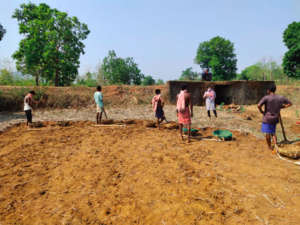 Being inspired by the GP functionaries and the volunteers of CYSD, Biswanath put job demand in his Panchayat office and was called to join the earthwork for construction of village road under MGNERGS. Getting engagement as daily labourer @207 per day, Biswanath was bit ashamed while comparing his past income against the existing job available nearer by his community.
Being inspired by the GP functionaries and the volunteers of CYSD, Biswanath put job demand in his Panchayat office and was called to join the earthwork for construction of village road under MGNERGS. Getting engagement as daily labourer @207 per day, Biswanath was bit ashamed while comparing his past income against the existing job available nearer by his community.
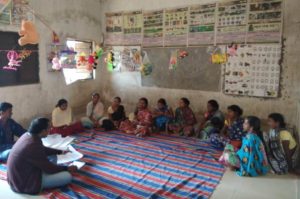 Maliguda Anganwadi Center is coming under Kollar Panchayat of Boipariguda block of Koraput district which serves 73 beneficiaries. Of the 73 beneficiaries, there are 20 children ageing 6 months to 3 years, 20 children between the age group of 3 to 6 years, 25 adolescent girls, 4 pregnant women and 4 lactating mothers.
Maliguda Anganwadi Center is coming under Kollar Panchayat of Boipariguda block of Koraput district which serves 73 beneficiaries. Of the 73 beneficiaries, there are 20 children ageing 6 months to 3 years, 20 children between the age group of 3 to 6 years, 25 adolescent girls, 4 pregnant women and 4 lactating mothers.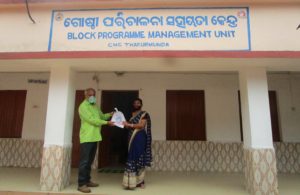
 Supriya Mohapatra of Sabalkana Village in Mahanga Block of Cuttack used to do household chores from dawn till dusk at her in-laws house, in fact, until every member had gone to bed at the end of the day. Her in-laws always had some chore or the other to burden her with, and she would oblige. Meanwhile, she became a victim of domestic violence. Finally, she was divorced and came back to her parent’s place. The financial crisis of the family and the burden of a divorced daughter made her parents vulnerable. Being a Brahmin caste married lady, Supriya’s staying at parent’s house was not accepted by the community. She arrested herself in cornor of a room and stopped speaking to anyone. Gradually, she became mentally weak. Days became hard and her life became hail until she learnt about the Internet Saathi programme and decided to join it.
Supriya Mohapatra of Sabalkana Village in Mahanga Block of Cuttack used to do household chores from dawn till dusk at her in-laws house, in fact, until every member had gone to bed at the end of the day. Her in-laws always had some chore or the other to burden her with, and she would oblige. Meanwhile, she became a victim of domestic violence. Finally, she was divorced and came back to her parent’s place. The financial crisis of the family and the burden of a divorced daughter made her parents vulnerable. Being a Brahmin caste married lady, Supriya’s staying at parent’s house was not accepted by the community. She arrested herself in cornor of a room and stopped speaking to anyone. Gradually, she became mentally weak. Days became hard and her life became hail until she learnt about the Internet Saathi programme and decided to join it.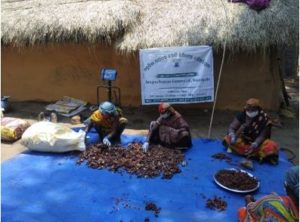 Sabujima Producer Company Ltd (SPCL) is a tribal women producer collectives established during 2017 in Boipariguda block of Koraput district, Odisha. The collectives work on aggregation and value addition of forest and agro produces grown by its members. Produces get value added in different form and size depending upon the market requirements. Produces like, Tamarind, wild Honey, Amla, Turmeric and Millets are taken into second and third level of value addition. The practice of value addition mostly undertaken at household level by the members and the remaining at the central processing unit setup by the company.
Sabujima Producer Company Ltd (SPCL) is a tribal women producer collectives established during 2017 in Boipariguda block of Koraput district, Odisha. The collectives work on aggregation and value addition of forest and agro produces grown by its members. Produces get value added in different form and size depending upon the market requirements. Produces like, Tamarind, wild Honey, Amla, Turmeric and Millets are taken into second and third level of value addition. The practice of value addition mostly undertaken at household level by the members and the remaining at the central processing unit setup by the company.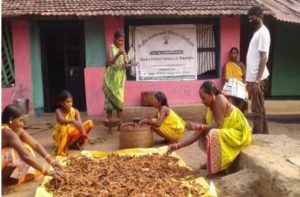 In a monthly Board of Directors meeting, decision was taken to procure seedless tamarind from its members to give the producers additional labour engagement and minimise risk of produce. In between some regular buyers were contacted by the company for sale of seedless tamarind but their response was very frosted taking the plea of lockdown and market slow down. They too started bargaining with the company in terms of price and quality. Finally, two buyers shown interest to procure the produce in good price with agreed term and condition of the Company.
In a monthly Board of Directors meeting, decision was taken to procure seedless tamarind from its members to give the producers additional labour engagement and minimise risk of produce. In between some regular buyers were contacted by the company for sale of seedless tamarind but their response was very frosted taking the plea of lockdown and market slow down. They too started bargaining with the company in terms of price and quality. Finally, two buyers shown interest to procure the produce in good price with agreed term and condition of the Company.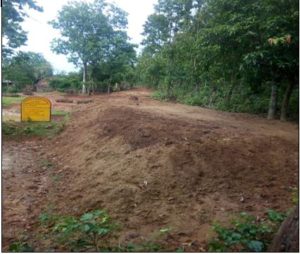 With the lifting of Lockdown.2, around 130 job cardholders of Taramara village demanded job under MGNREGS. The process was facilitated by CYSD volunteers and GRS of Taramara Panchayat. Beforehand, the community members were oriented on the various permissible works under MGNREGS, how to obtain new job card, how to follow job demand process and receive acknowledgement from service provider. The orientation also made them aware regarding the provisions available at work site and the process involved for transaction of wage through bank transfer.
With the lifting of Lockdown.2, around 130 job cardholders of Taramara village demanded job under MGNREGS. The process was facilitated by CYSD volunteers and GRS of Taramara Panchayat. Beforehand, the community members were oriented on the various permissible works under MGNREGS, how to obtain new job card, how to follow job demand process and receive acknowledgement from service provider. The orientation also made them aware regarding the provisions available at work site and the process involved for transaction of wage through bank transfer.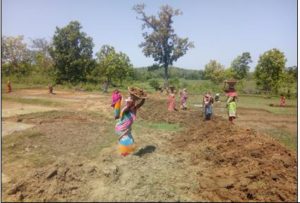 During the execution of work, CYSD programme team closely monitored the process with help of local CDWs, youth volunteers and project monitoring committee. The team also ensured the facilities like, drinking water, rest-shed, crèche for children and display of transparency board at work site. Emphasis was given on maintenance of physical distancing, use of mask (using towel or saree to cover mouth and nose), no spilt and tobacco use at the workplace. Besides, hand wash with soap was ensured during break for food and leisure time.
During the execution of work, CYSD programme team closely monitored the process with help of local CDWs, youth volunteers and project monitoring committee. The team also ensured the facilities like, drinking water, rest-shed, crèche for children and display of transparency board at work site. Emphasis was given on maintenance of physical distancing, use of mask (using towel or saree to cover mouth and nose), no spilt and tobacco use at the workplace. Besides, hand wash with soap was ensured during break for food and leisure time. Since the partial lifting of the lockdown in some parts of the country, various state governments have started MGNREGS activities in some measure.
Since the partial lifting of the lockdown in some parts of the country, various state governments have started MGNREGS activities in some measure. Since 1990, CYSD has got involved with WASH domain starting from low-cost toilet programmes to village cleanliness through work camps and awareness generation campaigns. In subsequent years, the organization has engaged in community awareness to save water; water security plans at the village and Panchayat level; school hygiene improvement; drinking water supply in urban slums of Bhubaneswar; testing water quality and portability; capacity building of village-level water and sanitation committees; promotion of use of sanitary napkins at urban & rural areas; and undertaking evaluations, etc.
Since 1990, CYSD has got involved with WASH domain starting from low-cost toilet programmes to village cleanliness through work camps and awareness generation campaigns. In subsequent years, the organization has engaged in community awareness to save water; water security plans at the village and Panchayat level; school hygiene improvement; drinking water supply in urban slums of Bhubaneswar; testing water quality and portability; capacity building of village-level water and sanitation committees; promotion of use of sanitary napkins at urban & rural areas; and undertaking evaluations, etc.